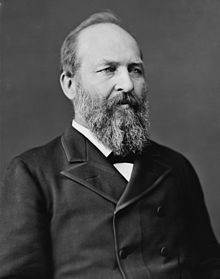James A. Garfield Remembers Abraham Lincoln

On April 14, 1866, Ohio Representative James A. Garfield stood and used the occasion of the first anniversary of Lincoln’s assassination to eulogize the late president. Though he had only been in office little more than three years, Garfield’s eulogy is remarkable more because of what followed—what no one, especially Garfield, could have foreseen. In the 1880 election James Garfield beat Winfield S. Hancock and thus joined the rarest of clubs: President of the United States. And then, in a shock that stunned the nation, just shy of four months in office, Garfield was shot in the back by Charles J. Guiteau on July 2, 1881. Unlike Lincoln, though, Garfield did not die in a matter of hours. He lived until September 19, 1881, passing away at a beach house in Elberon, New Jersey. Garfield would become a eulogized president, just as he had eulogized Lincoln fifteen years earlier. Printed here is Garfield’s eulogy, in full, to the late Abraham Lincoln– a future slain president remembering his predecessor.
“Mr. Speaker, I desire to move that this House do now adjourn. And before the vote upon that motion is taken I desire to say a few words.
“This day, Mr. Speaker, will be sadly memorable so long as this nation shall endure, which God grant may be “till the last syllable of recorded time,” when the volume of human history shall be scaled up and delivered to the omnipotent Judge.
“In all future time, on the recurrence of this day, I doubt not that the citizens of this Republic will meet in solemn assembly to reflect on the life and character of Abraham Lincoln, and the awful tragic event of April 14, 1865—an event unparalleled in our own. It is eminently proper that this House should this day place upon its records a memorial of that event.
“The last five years have been marked by wonderful developments of individual character. Thousands of our people before unknown o fame have taken their places in history, crowned with immortal honors. In thousands of humble homes are dwelling heroes and patriots whose names shall never die.
“But greatest among all these great developments were the character and fame of Abraham Lincoln, whose loss the nation still deplores. His character is aptly described in the words of England’s great laureate—written thirty years ago—in which he traces the upward steps of some—
‘Divinely gifted man,
Whose life in low estate began,
And on simple village green:’
Who breaks his birth’s invidious bar,
And grasps the skirts of happy chance,
And breasts the blows of circumstance,
And grapples with his evil star;
Who makes by force his merit known
And lives to clutch the golden keys,
To mould a mighty state’s decrees,
And shape the whisper of the throne;
And moving up from high to higher,
Becomes on Fortune’s crowning slope
The pillar of a people’s hope,
The centre of a world’s desire[.]’
“Such a life and character will be treasured forever as the sacred possession of the American people and of mankind. In the great drama of the rebellion there were two acts. The first was the war with its battles and sieges, victories and defeats, its sufferings and tears.
“That act was closing one year ago to-night, and just as the curtain was lifting on the second and final act, the restoration of peace and liberty; just as the curtain was rising upon new character and new events, the event spirit of the rebellion, in the fury of despair, nerved and directed the hand of the assassin to strike down the chief character in both.
“It was no one man who killed Abraham Lincoln; it was the embodied spirit of treason and slavery, inspired with fearful and despairing hate, that struck him down in the moment of the nation’s supremest joy.
“Ah! Sir there are times in the history of men and nations when they stand so near the veil that separates mortals from the immortals, time from eternity, and men from their God, that they can almost hear the beatings and feel the pulsations of the heart of the infinite. Through such a time has this nation passed. When two hundred and fifty thousand brave spirits passed from the field of honor through that thin vein to the presence of God, and when at last its parting folds admitted the martyr President to the company of the dead heroes of the Republic, the nation stood so near the veil that the whispers of God were heard by the children of men.
“Awe-stricken by His voice, the American people knelt in tearful reverence and made a solemn covenant with Him and with each other that this nation should be saved from its enemies, that all its glories should be restored, and on the ruins of slavery and treason the temples of freedom and justice should be built and should survive forever. It remains for us, consecrated by that great event, and under a covenant with God, to keep that faith, to go forward in the great work until it shall be completed.
“Following the lead of that great man and obeying the high behest of God, let us remember that—
‘He has sounded forth a trumpet that shall never call retreat;
He is sifting out the hearts of men His judgment seat.
Be Swift my soul to answer him, be jubilant my feet;
For God is marching on.’
“I move, sir, that this House do now adjourn.” [1]
————
1. Congressional Globe, House of Representatives, 39th Congress, 1st Session, 1952-1953.
Thanks for sharing this, Ryan.
Garfield is easily one of the most fascinating people to ascend to the White House, probably because his tenure was cut short in such a dramatic way, leaving huge questions about Garfield’s unrealized potential.